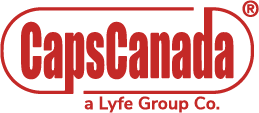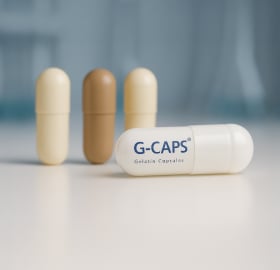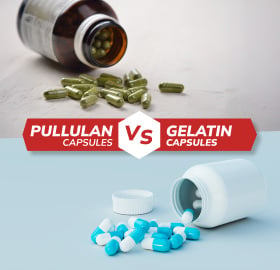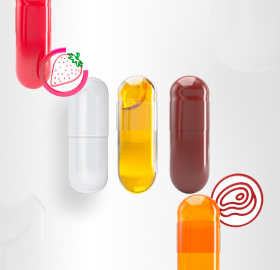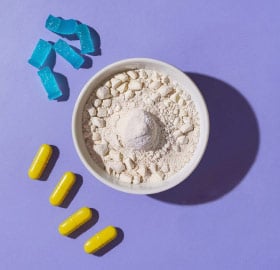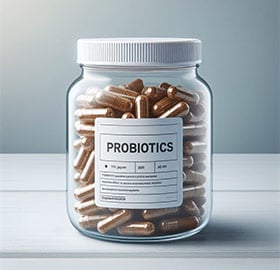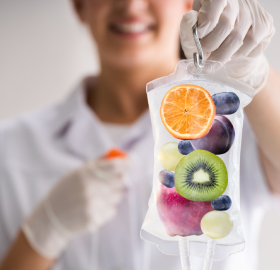Encapsulation, used in both medications and dietary supplements, is one of the most common processes used by pharmaceutical and nutraceutical companies worldwide. Two of the most popular types of empty capsules used by both industries are gelatin capsules and HPMC capsules (hydroxypropyl methylcellulose), also known as “vegetarian capsules.”
Today the global demand for empty capsules is skyrocketing. According to the the gelatin-based capsule market and the vegetarian-based capsule market combined are expected to grow from approximately $2,956.6 million in 2024 to around $6,378.6 million by 2034, reflecting a compound annual growth rate (CAGR) of 8.0%.
Beyond the impressive growth and value of empty capsules in the human health and wellness, it is important to understand the differences between these types. Let’s take a look at each of these capsule types…
What are Gelatin capsules?
Gelatin capsules are composed of gelatin manufactured from collagen derived from pork or bovine sources. Bovine hide is considered to be one of the best choices, as it enables the capsules to be Kosher and Halal certified, meeting the religious and dietary needs of a broader range of consumers.
Gelatin capsules are commonly used in the global market, known for:
- Being the most common type of capsule used in the pharmaceutical industry.
- Offering flexibility for a wide range of formulations and applications.
- Ability to include custom flavors to mask unpleasant smell and taste of the encapsulated drug.
- Recognized by most of the world's regulatory authorities as “Generally Recognized as Safe (GRAS)” for human consumption.
- Do not contain GMOs, are completely natural, and are allergen free.
- Cost-efficiency with production cost about 30% lower than other alternatives.
Uncover new insights in the world of capsules...
What K-CAPS® New Vegan Certification Means for Your Brand
Why Liquid-Filled Hard Capsules May Be a Better Option than Softgels
Flavored capsules: the next customization level
What are Vegetarian HPMC Capsules and why are they popular?
HPMC Capsules or Vegetarian Capsules, made from plant-based hydroxypropyl methylcellulose, offer an alternative to animal-derived capsules. Hypromellose Capsules have gained popularity due to their natural origin and superior stability, particularly in markets demanding vegan or vegetarian options, being an effective alternative to gelatin-based capsules.
Their most notable characteristics are:
- Provide health-conscious consumers with a natural, 100% vegetable-derived alternative to animal-derived capsules.
- Ideal for individuals with religion-based dietary restrictions.
- Offer the ability to address today's API challenges as well as the requirement for rapid product development.
- Can withstand high temperature and humidity conditions, protecting their content from all kinds of fluctuations; this makes them ideal for hygroscopic formulations.
The key HPMC consumption markets are located in developed countries with a market share above 52%, with North America and Europe having the biggest percentage in the market.
HPMC vs. Gelatin Capsules: Core Differences
Choosing between gelatin or vegetable capsules depends on several factors, including the material to encapsulate, costs, and target audience. Both types of capsules come in various sizes, colors, and designs and can be customized to fit any demand.
Both gelatin and HPMC capsules are durable if certain conditions are met. The shelf life for gelatin capsules is five years if the capsules are kept at the recommended storage temperature of 59°-77°Fahrenheit / 15°-25°Celsius, with a relative humidity between 35 and 65%. HPMC capsules also have a five-year shelf life, although they can tolerate greater heat and humidity. Here the recommended conditions are more forgiving: storage temperature of 59°-86°Fahrenheit / 15°-30°Celsius with a relative humidity between 35 and 70%.
Over the years, gelatin capsules have been the preferred choice of hundreds of pharmaceutical and nutraceutical industries and are forecasted to remain relatively popular. However, as more consumers seek “natural” and vegan products, vegetable-based capsules have begun to penetrate leading markets in Western Europe, Canada and the United States.
From a chemical perspective:
- Gelatin capsules dissolve quickly in stomach acid, making them suitable for immediate-release formulations.
- HPMC capsules exhibit resistance to gastric acids and are ideal for delayed-release and enteric-coated applications.
Both capsule types offer customization in size, color, and branding, and maintain a shelf life of up to five years under recommended conditions: - Gelatin: 15°-25°C (59°-77°F) and 35-65% RH.
- HPMC: 15°-30°C (59°-86°F) and 35-70% RH.
With growing demand for plant-based and sustainable health products, Plant-based capsules are expanding rapidly in leading markets. However, gelatin-based capsules continue to be the standard in many pharmaceutical formulations due to their cost advantage and regulatory familiarity.
Both G-CAPS® gelatin capsules and K-CAPS® HPMC capsules, offer effective solutions depending on specific application and consumer expectations. This highlights the difference between hard gelatin capsule and HPMC capsule: one prioritizes cost and tradition, while the other emphasizes sustainability and stability.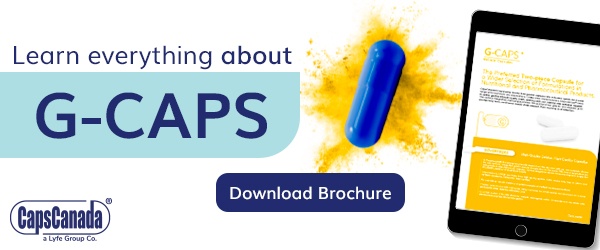
Frecuently Asked Questions (FAQ)
What are the benefits of hypromellose vegan capsules?
Hypromellose vegan capsules provide a plant-based solution free from allergens, preservatives, and GMOs. Their resistance to environmental conditions (heat and humidity) ensures better protection for sensitive ingredients, particularly useful for hygroscopic and delayed-release formulations.
Are HPMC capsules as effective as gelatin capsules?
Yes, HPMC capsules are equally effective and often better for moisture-sensitive or plant-based products. With Kosher, Halal, and vegan certifications, they are a versatile choice for today’s health-conscious B2B markets in pharma and nutra sectors.
Choosing between gelatin vs. HPMC capsules ultimately depends on your formulation needs and consumer preferences. With evolving market dynamics, both capsule types remain highly relevant for pharmaceutical and nutraceutical development.
Lyfe Group: Global Capsule Solutions
CapsCanada is part of Lyfe Group, a collective of Lyfe companies committed to capsule innovation. Through advanced R&D, our products provide pharmaceutical and nutraceutical brands with high-quality capsule technologies, from gelatin and vegetarian capsules to specialized solutions like acid-resistant and delayed-release capsules.

